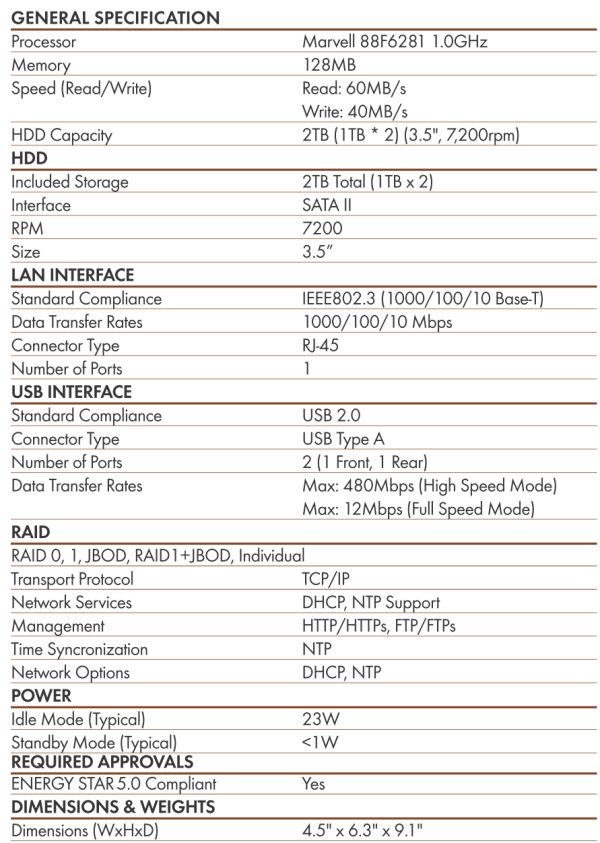The consumer Network Attached Storage (NAS) market has seen tremendous growth over the past few years. As connected homes become more ubiquitous, the need for centralised storage has become very important. On one hand, we have full blown NAS appliances like the ones from Synology and QNAP. They are aimed at the SMB market, but also serve home consumers well. On the other hand, we have appliances targeted specifically towards home consumers. D-Link and Netgear are some of the more famous companies catering to this market. LG is also trying to cater to this market with some NAS offerings aimed at the home consumer.
LG differentiates itself from the rest of the competitors' units by offering DVD and Blu-ray rewriters as part of the NAS unit. However, the unit we are looking at today is the plain vanilla offering.
The LG N2A2DD2 2TB (2x1TB) comes with two preinstalled hard disks. The disks in the N2A2 can't be replaced by the user. The diskless version is the N2R1D (based on a previous generation Marvell chipset), and it is much cheaper than the N2A2. We will come back to the comparisons with the N2R1D towards the end of the review, but first, let us look at the specs.
The full brochure from the LG website can be found here. In the next section we will take a look at the package contents.











24 Comments
View All Comments
Chupathingy220 - Monday, July 18, 2011 - link
I've been swinging back and forth between picking up a NAS like this one, or repurposing an old netbook I have lying about with some Linux server software and simply attaching drives to it via USB. Suggestions?kmmatney - Monday, July 18, 2011 - link
I would just suggest picking up a copy of WHS (only $59 at NewEgg) and eityher using your old laptop or making a cheap server. I tried various solutions, such as a home-made NAS and Linux (Amahi). In the end, it's just so much nicer using Windows Home server. My only regret was wasting so much time with other solutions before getting WHS.Zan Lynx - Monday, July 18, 2011 - link
You can get better performance with WHS (or Linux) and your own hardware. Gigabit jumbo frames, four or five fast hard drives, you should be able to get over 80 MB/s in sequential access.But you lose one of the bigger advantages these little NAS boxes have, which is low power consumption and quietness.
name99 - Monday, July 18, 2011 - link
Why limit yourself to WHS or Linux?You can use a Mac Mini (low power when it's on AND it can go to sleep, registering itself with an AirPort base station, to be woken as necessary.)
OSX offers built-in striping, so hook up 3 USB drives and you can hit basically 100MB/s or so reads and writes.
SilthDraeth - Monday, July 18, 2011 - link
Maybe if WHS was installed on the Mac Mini.EddieBoy - Monday, July 18, 2011 - link
I'll second the comment about trying Windows Home Server. I have been using Version 1 for several years and it works great. Version 2 is getting good reviews although a few people were upset that it doesn't continue the use of Drive Extender. That didn't bother me too much as there are add-ons for DE if you really feel you need that functionality. The Newegg price for WHS is very tempting. I may have to grab a copy of Version 2 and upgrade my configuration.phu5ion - Monday, July 18, 2011 - link
If you are going to re-purpose an existing system, use a Linux server OS. You don't want some pesky GUI eating CPU time like some other OS options.kmmatney - Monday, July 18, 2011 - link
The GUI is Windows XP based - very light. You use a console app to connect to it most of the time, anyways. The GUI comes in handy when you need it. A lot of us just don't know Linux all that well to attempt running it without a GUI. I also use WHS to share (sort of) a scanner.ShoePuke - Monday, July 18, 2011 - link
I too agree that for most of the people that read Anandtech, a DIY NAS will get you way more features for same or less money. I was pretty psyched about WHS until they removed data redundancy in the new version (I thought that was it's best feature!). Now I'm using unRAID and love it. My 14 TB unRAID box draws ~35w idle and ~80w peak. Really like being able to mix drive sizes w/o penalty while having parity.Rick83 - Monday, July 18, 2011 - link
just got a 20 euro more expensive buffalo 2-disk NAS, which allows proper hot swap, but it is insanely loud (for what it is).I'd expect these enclosures to be silent and the disks to be minimally intrusive, but this one will have to be hidden in an insulated cupboard..